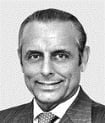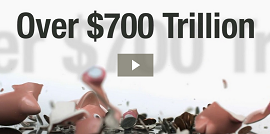A U.S. Court Practically Declared Insider Trading Legal
Wednesday, December 10, 2014, was a big day for insider trading.
A three-judge panel of the U.S. Second Circuit Court of Appeals overturned insider trading convictions of former hedge fund managers Todd Newman and Anthony Chiasson.
Not only did the appeals court reverse the much-publicized guilty verdicts against the two traders, its 28-page decision effectively rewrites the meaning of insider trading.
The immediate outcome of the decision not only affects the two hedge fund executives, other traders convicted of insider trading, and charged individuals who pled guilty, it will also change how traders use inside information to their benefit in the future.
The court decision is as surprising as it is profound…
This Changes Trading Forever
Because the surprise unanimous appeals court decision immediately vacated the May 2013 judgments of conviction against Newman and Chiasson on charges of conspiracy to commit insider trading and insider trading in violation of 18 U.S.C. § 371, sections 10(b) and 32 of the Securities Exchange Act of 1934, SEC Rules 10b‐5 and 10b5‐2, and 18 U.S.C. § 2.
Adding insult to injury for Preet Bharara, the Manhattan U.S. Attorney who oversaw the six-week jury trial, which was heard in the U.S. District Court for the Southern District and presided over by Judge Richard J. Sullivan, the appeals court dismissed the entire suit with prejudice.
According to IllinoisLegalAid.org, "In the formal legal world a court case that is dismissed with prejudice means that it is dismissed permanently. A case dismissed with prejudice is over and done with, once and for all, and can't be brought back to court."
Now, not only won't there be any re-trial based on the appeals court decision, the only way similarly derived convictions will stand up on appeal will be if the matter makes it to the Supreme Court.
What happened – and how it happened – matters.
An Impossibly High Bar Is Set
The bottom line: As far as the appeals court's ruling, Judge Richard Sullivan gave the jurors hearing the case against both traders erroneous instructions. The appeals court said that he set the bar too low, which made it easy for jurors who deliberated for two days to reach a guilty verdict.
But the real bombshell in the Appeals Court decision is what it says is required to prove insider trading.
Insiders at Dell Inc. (formerly Nasdaq: DELL) and Nvidia Corp. (Nasdaq: NVDA) passed along information about what was going on in their companies to some contacts, which made its way through some fuzzy Wall Street "intelligence networks" (in reality, glorified gossip channels papered over with research notes) to analysts, who transmitted the information to analysts who worked for Newman and Chiasson. They traded on the information and made about $72 million.
While Judge Sullivan told jurors it was enough to show the traders knew the information they traded on resulted from a breach of fiduciary duty on the part of the tipsters at Dell and Nvidia, it didn't matter if the tipsters received benefits as a result of their tips. The appeals court wholeheartedly disagreed.
The new interpretation of what constitutes insider trading effectively says, a prosecutor must prove that the "tip-ee" knew that the "tipster" committed a breach of their fiduciary duty in disclosing inside information, and that the "tip-ee" knew that the "tipster" would gain a tangible reward of "some consequence."
Only one of the tipsters in the case received any gain. And that was merely "career advice." As such, the appeals court determined that there was no gain of any consequence, and further, that the traders didn't get the information first-hand.
Experts Despair of Ever Fixing the Problem
I spoke to New York securities attorney Bill Singer – editor of the widely followedBrokeandBroker.com site, who was formerly on the regulatory side of securities lawyering but now represents broker-dealers, brokers, traders, and their customers – for his reaction to the decision.
"This is one of those rare cases that is actually historic," Singer said. "The appeals court decision largely eviscerates any further or future prosecution of similar cases."
The bar for the burden of proof has been raised Singer told me. "Now there are two hurdles," he explained. "It has to be proved beyond a reasonable doubt that the tipper knew he was breeching his fiduciary duty and would benefit, meaning probably receive compensation, andit must be proved beyond that elusive reasonable doubt, that the tip-ee knew the tipster was breeching his duty and knew that the tipster would benefit through some tangible reward. All that, beyond a reasonable doubt."
So, if the bar to prove insider trading has been raised, I asked the securities expert, is there an easier way under it now?
"Here's my cynical response," Singer replied, "This provides a roadmap to tipsters and tip-ees on how to distance themselves from bumping into the existing statutes."
He's not alone in recognizing the fuzzy legal ramifications of many of the statutes governing Wall Street.
Judge Barrington D. Parker, writing the appeals court decision on behalf of the panel that included Judge Ralph K. Winter Jr. and Judge Peter W. Hall, said, "Although the government might like the law to be different, nothing in the law requires a symmetry of information in the nation's securities markets."
As if there wasn't enough asymmetry already dividing the haves from the have-nots, there's now a higher bar for fleet-footed, "in-the-know" traders to waltz right under.
You may also like...
PREMIUM CONTENTCIA Insider: "Forget Iran, Iraq, Ukraine, and Syria this is where WWIII will start"
By JIM RICKARDS, Financial Threat and Asymmetric Warfare Advisor, CIA & The Director of National Intelligence
Should the rise of conflicts across the Middle East and Ukraine serve as a warning sign that something much more dangerous is approaching?

According to Jim Rickards, the CIA's Asymmetric Warfare Advisor, the answer is yes.
In a startling interview he reveals that all 16 U.S. Intelligence Agencies have begun to prepare for World War III.
Making matters worse, his colleagues believe it could begin within the next 6 months.
However, the ground zero location for this global conflict is what makes his interview a must-see for every American.
Take a few moments to watch it here and decide for yourself.




 Watch the full presentation.
Watch the full presentation.
No comments:
Post a Comment